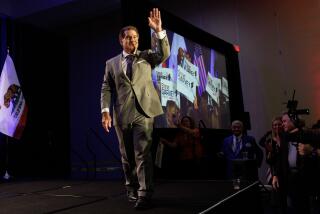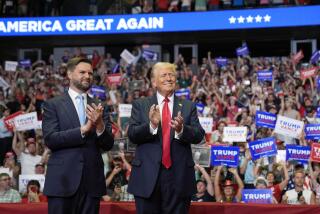McCain Cites Ongoing Dispute With Bush
- Share via
WASHINGTON — Sen. John McCain (R-Ariz.) said Thursday that he and George W. Bush have made little progress toward reconciliation since their bruising primary campaign, and called on the Texas governor to wage a more “positive” campaign than he has so far.
A visibly unhappy McCain accused the Bush campaign of trying to block his supporters from taking seats as delegates at the Republican National Convention in Philadelphia this summer, and said he and Bush won’t have much to talk about until that dispute is cleared up.
“We’re very unhappy that apparently they’re trying to deny us our delegates in both Michigan and Massachusetts,” McCain said in an interview in his Senate office. “We won those [primaries], so I think we ought to be entitled to our delegates.”
McCain won 52 of Michigan’s 58 delegates and all 37 of Massachusetts’ delegates. But because of state party rules, Bush supporters could get those seats and be sent to the convention, even though they must vote for McCain.
In Michigan, the actual delegates will be chosen at a state convention in May, and Gov. John Engler, a longtime Bush supporter, has said he intends to pick as many Bush backers as he can. In Massachusetts, most delegates are elected at local party caucuses, and Gov. Paul Cellucci, another Bush partisan, will wield considerable clout.
A spokesman for the Bush campaign, Ari Fleischer, pointed out that delegates from those states will still be pledged to vote for McCain on the convention’s first ballot, even if they are Bush supporters.
But McCain said he wants his own supporters in the hall--and in the conventions’s platform debate and other proceedings.
“It’s hard for me to understand,” he said, sighing and shaking his head. “Perhaps it could be that [Engler and Cellucci] are doing it rather than the Bush campaign--although these governors are chairmen of the Bush campaign in their respective states.”
He said former Sen. Bob Dole (R-Kan.) is still trying to arrange a Bush-McCain meeting, but with little success. “I think what Bob’s trying to do is work out differences . . . [and] arrange an environment where we can sit down and discuss issues together,” he said.
But no meeting has been scheduled, and McCain has had no direct contact with Bush since he withdrew from the GOP race two weeks ago.
The lingering bitterness between McCain and Bush could affect the Texas governor’s chances in the fall. A survey released Thursday found that the majority of independent voters who supported McCain during the primaries have largely transferred their allegiance to Vice President Al Gore, the likely Democratic nominee. The Pew Research Center for People and the Press poll found among independents who had backed McCain, 54% now said they favored Gore.
McCain, who has rejected the idea of running for vice president with Bush, said he would not rule out accepting a Cabinet post. “I haven’t thought about it,” he said. “I guess I wouldn’t categorically rule [it] out. But I also believe that I can be most effective here in the Senate. . . . I find it hard to envision a scenario where I would want to move into a Cabinet post.”
As for the presidential contest in 2004, he said it was too early to even consider. “I’m in step two of recovery right now. It would be hard to contemplate such an eventuality.”
Returning to this year’s race, McCain said Bush needs to offer voters a more “positive, inclusive, big-tent” message than he has thus far, and avoid being drawn into a duel of negative charges with Gore. “I think he has to take positive steps to return to his best themes,” McCain said.
He also admonished Bush against writing off California in the general election campaign. “Don’t give up on it; fight for it!” he said. “Isn’t that . . . what his father did?” McCain asked, referring to the 1992 contest between then-President George Bush and Democratic candidate Bill Clinton.
Some GOP strategists have argued that California is already out of reach for the Texas governor this year. But Bush and his aides have insisted they will compete in the state.
McCain said he is preparing another campaign finance reform bill with his main ally in that fight, Sen. Russell D. Feingold (D-Wis.). Their previous bills have been thwarted.
McCain said he does not support a less ambitious reform proposal by Sen. Charles Hagel (R-Neb.) because it does not restrict soft money contributions to state political parties. Banning such contributions, which are unlimited and largely unregulated, has been the cornerstone of his effort.
More to Read
Sign up for Essential California
The most important California stories and recommendations in your inbox every morning.
You may occasionally receive promotional content from the Los Angeles Times.















